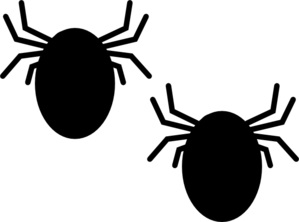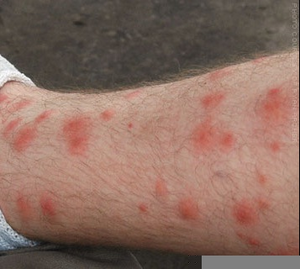- Like
- Digg
- Del
- Tumblr
- VKontakte
- Buffer
- Love This
- Odnoklassniki
- Meneame
- Blogger
- Amazon
- Yahoo Mail
- Gmail
- AOL
- Newsvine
- HackerNews
- Evernote
- MySpace
- Mail.ru
- Viadeo
- Line
- Comments
- Yummly
- SMS
- Viber
- Telegram
- Subscribe
- Skype
- Facebook Messenger
- Kakao
- LiveJournal
- Yammer
- Edgar
- Fintel
- Mix
- Instapaper
- Copy Link
A version of this column first ran in the Roane County (WV) Reporter and Times Record. Support local journalism! Subscribe to your local newspaper.
 This week I’m going to talk about the bugs that bother, not gardens, but gardeners. There may occasionally be mosquitoes or gnats, but they are not prevalent around here. Deer flies are problematic in spring but only in sunshine and they usually are solitary.
This week I’m going to talk about the bugs that bother, not gardens, but gardeners. There may occasionally be mosquitoes or gnats, but they are not prevalent around here. Deer flies are problematic in spring but only in sunshine and they usually are solitary.
Bees and wasps may be a problem if you’re allergic to bee stings; otherwise you can ignore them unless you get a yellow jacket nest in your garden. Their stings are nasty, and they want to protect their nest (in the ground) so you will likely have to resort to pouring kerosene down their hole, as undesirable as it is to kill pollinators. (Ed. note: I used boiling soapy water done a yellow jacket hole for a nest they had established in my potato patch (about which I found out the hard way). It worked.)
Ticks are more likely to be prevalent in uncultivated parts of your property, but you may encounter them in your garden or orchard, and somehow these days there are several new species, tiny ones that are hard to see and which carry diseases. My dog has Lyme disease, which I’m told is endemic in Roane County (in humans as well as dogs). We get very few ticks, probably because I have free range chickens, which eat them. If you are not so lucky, you need to monitor yourself after potential exposure.
 For me the big problem is chiggers. Some people are lucky enough to not be bothered by these. These frequent the same kind of territory as ticks: woods, tall grass and weeds, and gardens. Unfortunately, they’re too small to see. There are a lot of myths about chiggers, which I want to correct.
For me the big problem is chiggers. Some people are lucky enough to not be bothered by these. These frequent the same kind of territory as ticks: woods, tall grass and weeds, and gardens. Unfortunately, they’re too small to see. There are a lot of myths about chiggers, which I want to correct.
No, chiggers do not burrow under your skin and stay there. Actually, they send a proboscis of some kind into your skin, which causes some skin cells to liquefy; the irritation causes your skin to harden around the site, forming a sort of straw and the bug then drinks up the skin cells through it. They don’t drink blood, and they don’t take enough cells to affect you—as with mosquitos, it’s your reaction to their saliva that causes the itch. Unfortunately, the itch can last up to three weeks in some people. For me, it’s five days with a really bad bite.
For the chigger, it take three days to absorb enough nutrients to reproduce, which means we are not responsible for new generations, as we will most certainly scratch them off long before that.
No, nail polish and nail polish remover will not suffocate the bug, which is not under your skin. In fact, I know of nothing that helps with a chigger bite. But there are means of preventing the bites. Some say you can repel them with strong smelling plants like mint—I’m not really sure this works. I think you might have to tie some into your shoelaces, fill your pockets, insert some into buttonholes…
Here’s what I do. It takes chiggers something like three hours to crawl over you to the site they pick for the bites, and get that skin straw going. So I get my gardening work done in summer during what I call my “chigger window.” I note the time when I get started, and three hours later I come in and take a shower, soaping and scrubbing the places chiggers bite. The result is that while I still get chigger bites, it’s more like one instead of several, and the one is mild, fading after a day or two.
Useful information from the University of Missouri: chiggers are inactive below 60 degrees and 42 degrees will kill them. I’ve noticed, though, that they dwindle in September even before we get a 42 degree night. The U of M also says chiggers can crawl off your clothes and find you later. So I put my dirty shirt and undies, and socks if I’m wearing any, into the freezer before my shower. The ones I put in yesterday, with any chiggers they might have carried now dead, go into the laundry basket. Pants I leave in the greenhouse, to use again without washing.
Use the comment section for questions, objections and suggestions.
